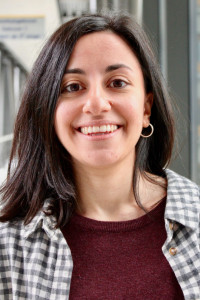PhD Sofia Thomaidou
Research:
Type 1 diabetes (T1D) is an autoimmune disease characterized by the selective and progressive destruction of the insulin-producing pancreatic β cells by the invading immune cells. The aim of the project is the discovery of HLA-A2-peptide complexes on the surface of β cells that may be recognized by autologous cytotoxic T cells. The identification of non-AUG translation sites, as well as evidences for translation outside annotated protein-coding open reading frames (ORFs), in β cells suggest that translation process significantly participate to the epitope diversity.
Curriculum Vitae:
I did my bachelor in biology at the University of Athens, Greece. During my BSc thesis, I studied the interaction of a family of proteins involved in Alzheimer’s disease in the lab of animal physiology of prof. Efthimiopoulos. After that, I followed a research MSc in Molecular and Cellular Biotechnology at Wageningen University. My MSc thesis was a collaboration of the molecular microbiology department with the biotech company Corbion, supervised by prof. J. van der Oost and R. van Kranenburg. The project aimed at unravelling the sugar metabolism of a novel bacterial species, to be used for the production of lactic acid. Next, I performed a six-month internship at APO-T, a pharmaceutical start-up company aiming at developing specific anti-cancer antibodies. Post-graduation, I was hired at APO-T as a junior scientist, where I continued my work on antibody production and characterization for two years. In 2017, I joined the research group of Dr. Zaldumbide at the Cell and Chemical Biology department.




